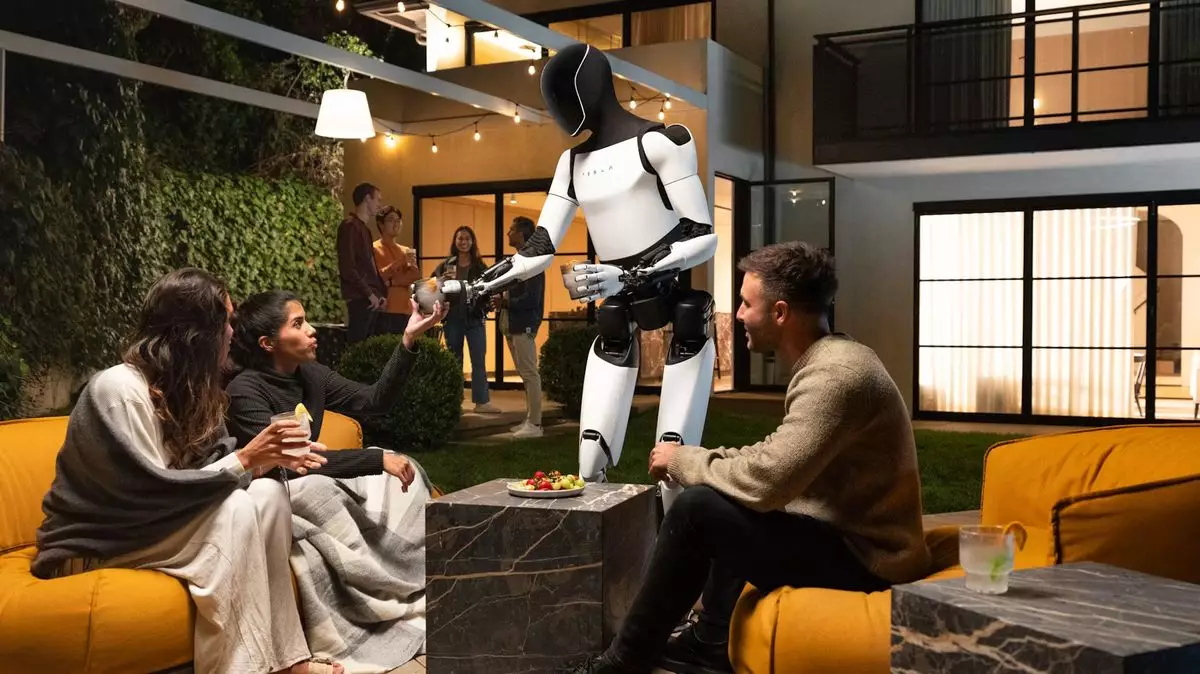In the ever-evolving landscape of technology, few names resonate as strongly as Elon Musk. Known for his audacious vision and unconventional business practices, Musk has made headlines yet again with the introduction of the Tesla humanoid robot, aptly named Optimus. However, while the excitement for such innovations mounts, a critical examination of the actual capabilities and underlying realities of these robots is essential.
The launch of Optimus has been marked by grand proclamations from Musk, who claims that this humanoid robot will become an indispensable part of everyday life. According to Musk, Optimus is poised to take on a variety of roles—from teaching to caring for children, walking dogs, and even serving drinks. At a recent Tesla event, he expressed his belief that the robot could become a ubiquitous companion for millions, stating, “It’s gonna be awesome. I think this will be the biggest product ever.” Such claims evoke excitement but also skepticism, especially considering the nature of technological advancements—particularly in the realm of robotics and artificial intelligence.
The core of Musk’s pitch revolves around the idea that Optimus will seamlessly integrate into human life and perform various tasks with ease. Yet, examining the underlying realities of robotics development raises questions about the feasibility of such sweeping promises. The fact that a prototype was initially presented as a man in a suit only adds fuel to a fire of skepticism that fuels discussions around the authenticity of these claims.
At the Tesla event dubbed “We, Robot,” a number of Optimus prototypes were shown in action, walking among attendees and even serving drinks. However, reports emerged suggesting that these robots were not operating independently but were instead being controlled remotely by Tesla employees. This revelation calls into question the actual capabilities of Optimus, bringing to light a significant contrast between Musk’s grandiose promises and the functional reality of the robots in action.
Musk’s failure to explicitly state that these robots were powered by autonomous AI during his presentation further intensifies suspicion. If Optimus truly embodied the advanced technologies Musk claims it does, transparency regarding its operational independence would seem paramount. Instead, the omission suggests a strategic decision to maintain an aura of mystery around the robots’ development, potentially as a means of avoiding competitive scrutiny.
Elon Musk’s history is littered with ambitious pledges that have not materialized as envisioned. From the timeline for fully autonomous electric vehicles to space colonization prospects on Mars, Musk’s past statements warrant a critical lens. The fervent hype surrounding the Optimus robot similarly risks presenting a narrative far removed from the real technological obstacles that lie ahead.
While there is undeniable potential for the development of autonomous, bipedal robots capable of performing the diverse tasks Musk envisions, the timelines for achieving such advances remain murky. The idea that we might soon have robots walking our dogs or mowing lawns is, at best, a distant hope, rather than an imminent reality. In a world striving for progress, it is essential to temper expectations with a dose of pragmatism.
In the world of technology and innovation, the balance between aspiration and reality is critical. As the public’s fascination with robotics grows, it is imperative to approach announcements with a critical mindset, distinguishing between authentic advancements and hyperbolic claims. While the ambition shown by Musk and Tesla in pursuing humanoid robots like Optimus is commendable, it is equally important to foster realistic expectations among consumers and tech enthusiasts alike.
The journey of Optimus serves as a reminder of the intricate relationship between innovation and integrity. As developments in robotics continue to unfold, ongoing scrutiny of claims made by industry leaders will be vital in keeping the conversation grounded in reality. Whether Optimus will eventually become a household companion or remain a technological mirage remains to be seen. For now, the world watches and waits, hoping that tomorrow’s visions will eventually translate into tangible improvements to daily life.


Leave a Reply